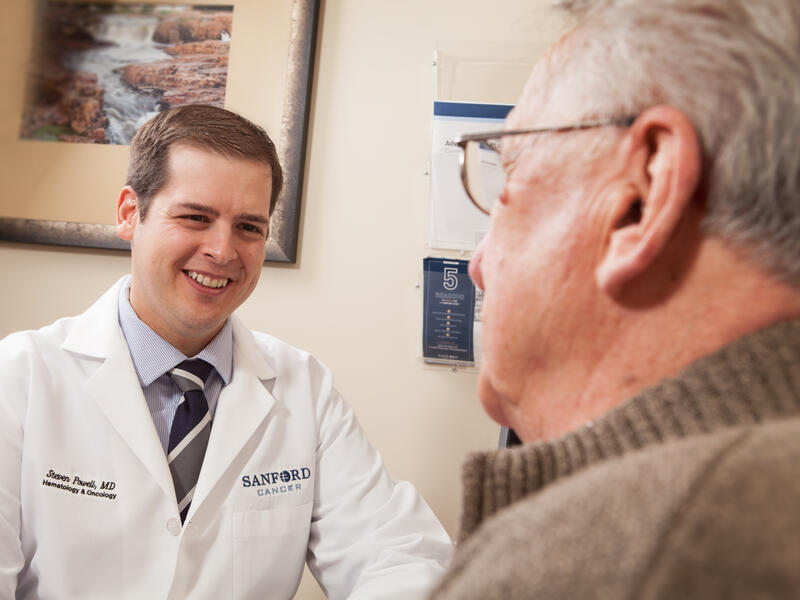Advancing treatments for cancer patients is no easy task. It takes multiple experts and organizations working together and building on each other’s work to make lifesaving breakthroughs possible.
Sanford Health is doing just that on the national stage by being part of two oncology networks.
Membership in a global network
The American Society of Clinical Oncology (ASCO) is a network of oncology professionals from a variety of disciplines, specialties and locations. The network connects nearly 45,000 experts from around the world.
Once a year, oncologists, researchers and members of the international medical community come together to discuss advances in cancer research at the ASCO Annual Meeting in Chicago.
Sanford Health physicians are heavily involved in ASCO’s research and care delivery efforts. Every year since 2014, representatives from Sanford Health have attended the conference. This past June, Sanford Health brought a team of 10 representatives.
Steven Powell, M.D., is a clinical oncologist and cancer researcher who has represented Sanford Health at the ASCO Annual Meeting for the past eight years. As the lead researcher on several clinical trials, Dr. Powell attends the conference to explore novel treatments for his patients.
“The ASCO Annual Meeting has become a sounding board for the biggest breakthroughs in cancer,” Dr. Powell said. “One of the reasons I go is to learn about the newest treatments being developed so that we can try to bring some of those here.”
According to Dr. Powell, a lot has changed in eight years.
“In 2014, people didn’t know who we were. They had no idea,” he said. “Now I can go to these meetings and meet with people, and they recognize Sanford Health.”
Connecting researchers, patients and communities
Sanford Health is also proud to be part of the National Cancer Institute’s (NCI) Community Oncology Research Program (NCORP).
NCORPs are competitive, federally funded clinical research grants. These grants give patients access to state-of-the-art cancer treatment trials in or near their community.
There are only 46 NCORP sites throughout the country. Sanford’s NCORP typically has 80 to 100 clinical trials open across most cancer types.
In addition to increasing trial access, NCORPs can help influence cancer research direction. These grants do this through membership in the NCI’s disease-oriented task forces and steering committees.
Task Forces help determine overarching research priorities for a designated condition. They are also the first to evaluate a new treatment standard for further development.
If a trial fits the designated priorities and seems feasible, it is then sent to the steering committees for closer review. The steering committees have the final say about whether a trial should continue to develop within the NCI system.
These committees each consist of 15 to 20 people from across the country. Each task force or steering committee focuses on a specific type of cancer, and its members are leading researchers on that type.
NCORP physicians are valuable members of these committees as they provide a practical, real-world perspective on trial feasibility. Generally, there are one to three NCORP members on any given committee. The NCORP members are chosen annually by election to fill vacating seats and serve three-year terms.
Sanford Health’s involvement in NCORP
The task forces and steering committees influence cancer research nationally.
“You want your best players involved,” explained David Pearce, Ph.D., the president of Sanford Research. “But you also don’t want any organization to be overrepresented. From the governance side of it, NCORP only allows four physicians per organization.”
Sanford Health NCORP is proud to have the maximum allowed number of physicians as members of these NCI committees.
The current members include:
- Preston Steen, M.D., on the Renal Task Force
- Jonathan Bleeker, M.D., on the Gastrointestinal Steering Committee
- Mark Gitau, M.D., on the Rare Tumor Task Force
Dr. Steen is also the principal investigator of Sanford’s NCORP grant.
“It’s a remarkable thing that we have the maximum number,” Dr. Steen said. “It indicates the standing of our organization and the quality of physicians in our oncology group.”
Benefits for cancer patients
By being active in ASCO and NCORP, Sanford Health can offer better access to clinical trials, which directly impacts patient care.
Clinical trials offer more treatment options. Participants are always offered the standard of care, meaning the current best treatments, plus the new option being studied. That new treatment could later become part of the standard of care, so participants get it a few years earlier than other patients.
According to Dr. Pearce, the national average of eligible cancer patients who join clinical trials is 3%. At Sanford Health, the average is more than 10% who join treatment trials.
“It doesn’t matter where you are in the country,” said Dr. Pearce. “If you have access to a site like Sanford Health, you’re getting the same opportunities as patients in bigger cities – if not more opportunities.”
Learn more about Sanford Health’s clinical research programs at research.sanfordhealth.org.
Learn more
- Child’s memory inspires gift for childhood cancer research
- National cancer study aims to reach Midwestern patients
- Podcast: Sanford Health, NCI connect to study, prevent cancer
…
Posted In Cancer, Cancer Screenings, Cancer Treatments, Research
